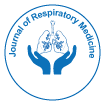The Base of Cystic Fibrosis Inheritable.
Received: 03-Jan-2022 / Manuscript No. jrm-22-52566 / Editor assigned: 05-Jan-2022 / PreQC No. jrm-22-52566 (PQ) / Reviewed: 11-Jan-2022 / QC No. jrm-22- 52566 / Revised: 17-Jan-2022 / Manuscript No. jrm-22-52566 (R) / Accepted Date: 19-Jan-2022 / Published Date: 25-Jan-2022
Cystic fibrosis is caused by mutations in the gene that produces the cystic fibrosis Tran’s membrane conductance controller (CFTR) protein.
In people with CF, mutations in the CFTR gene can disrupt the normal product or functioning of the CFTR protein plant in the cells of the lungs and other corridor of the body.
Cystic fibrosis is an illustration of a sheepish complaint. That means a person must have a mutation in both clones of the CFTR gene to have CF.
People who inherit one dupe of the CFTR gene that contains a mutation and one normal dupe are considered CF carriers [1]. CF carriers don't have the complaint but can pass their dupe of the imperfect gene on to their children.
The Changes in the CFTR Gene Affect the Body
Different types of changes, or mutations, in our genes affect the body in different ways. Within our inheritable encyclopedia, there are small differences in our genes. Occasionally the differences are minor or don't affect a person's health-- like two encyclopedia entries that are articulated in slightly different ways but still say the same thing. In these cases, people's genes may differ or the protein made by the gene is slightly different – performing in a different eye color-- but the genes and the proteins work rightly.
At other times, the change in a gene may beget the protein to not work or not be made at all. Cystic fibrosis is caused by mutations in the gene that produces the cystic fibrosis Tran’s membrane conductance controller (CFTR) protein [2]. This protein is responsible for regulating the inflow of swab and fluids in and out of the cells in different corridor of the body.
In people with CF, mutations in the CFTR gene can disrupt the normal product or functioning of the CFTR protein plant in the cells of the lungs and other corridor of the body.
Mutations in the CFTR gene beget the CFTR protein to malfunction or not be made at each, leading to a buildup of thick mucus, which in turn leads to patient lung infections, destruction of the pancreas, and complications in other organs.
Cystic fibrosis is an illustration of a sheepish complaint [3]. That means a person must have a mutation in both clones of the CFTR gene to have CF. However, he or she doesn't have CF and is a CF carrier, If someone has a mutation in only one dupe of the CFTR gene and the other dupe is normal. About 10 million people in the United States are CF carriers.
CF carriers can pass their dupe of the CFTR gene mutation to their children. Each time two CF carriers have a child together, the chances are
25 percent (1 in 4) the child will have CF
50 percent (1 in 2) the child will be a carrier but won't have CF
25 percent (1 in 4) the child won't be a carrier of the gene and won't have CF
People with CF can also pass clones of their CFTR gene mutations to their children. However, the chances are, If someone with CF has a child with a CF carrier [4].50 percent (1 in 2) the child will have CF
50 percent (1 in 2) the child will be a carrier but won't have CF
Children of two carriers may be CF carriers like their parents. In a family with four children, it's possible that none of the children, some of the children, or all of the children will have CF [5]. Each baby has the same chance to inherit CFTR mutations from both parents, no matter whether any of the other siblings are carriers or have CF. When someone with CF has children with a CF carrier, the children will either be CF carriers or have CF.
References
- Rafeeq MM, Murad HAS (2017) Cystic fibrosis: current therapeutic targets and future approaches. J Transl Med 15:84-89.
- De Boeck K (2020) Cystic fibrosis in the year 2020: A disease with a new face. Acta Paediatr 109:893-899.
- Ooi CY, Durie PR (2016) Cystic fibrosis from the gastroenterologist's perspective. Nat Rev Gastroenterol Hepatol 13:175-185.
- Ode KL, Chan CL, Granados A, Moheet A, Moran A et al. (2019) Cystic fibrosis related diabetes: Medical management. J Cyst Fibros 2:S10-S18.
- Prentice B, Hameed S, Verge CF, Ooi CY, Jaffe A et al. (2016 ) Diagnosing cystic fibrosis-related diabetes: current methods and challenges. Expert Rev Respir Med 10:799-811.
Indexed at, Google Scholar, Crossref
Indexed at, Google Scholar, Crossref
Indexed at, Google Scholar, Crossref
Indexed at, Google Scholar, Crossref
Citation: Goralski JL (2022) The Base of Cystic Fibrosis Inheritable. J Respir Med 6: 122.
Copyright: © 2022 Goralski JL. This is an open-access article distributed under the terms of the Creative Commons Attribution License, which permits unrestricted use, distribution, and reproduction in any medium, provided the original author and source are credited.
Share This Article
Recommended Journals
Open Access Journals
Article Usage
- Total views: 1327
- [From(publication date): 0-2022 - Mar 04, 2025]
- Breakdown by view type
- HTML page views: 991
- PDF downloads: 336
